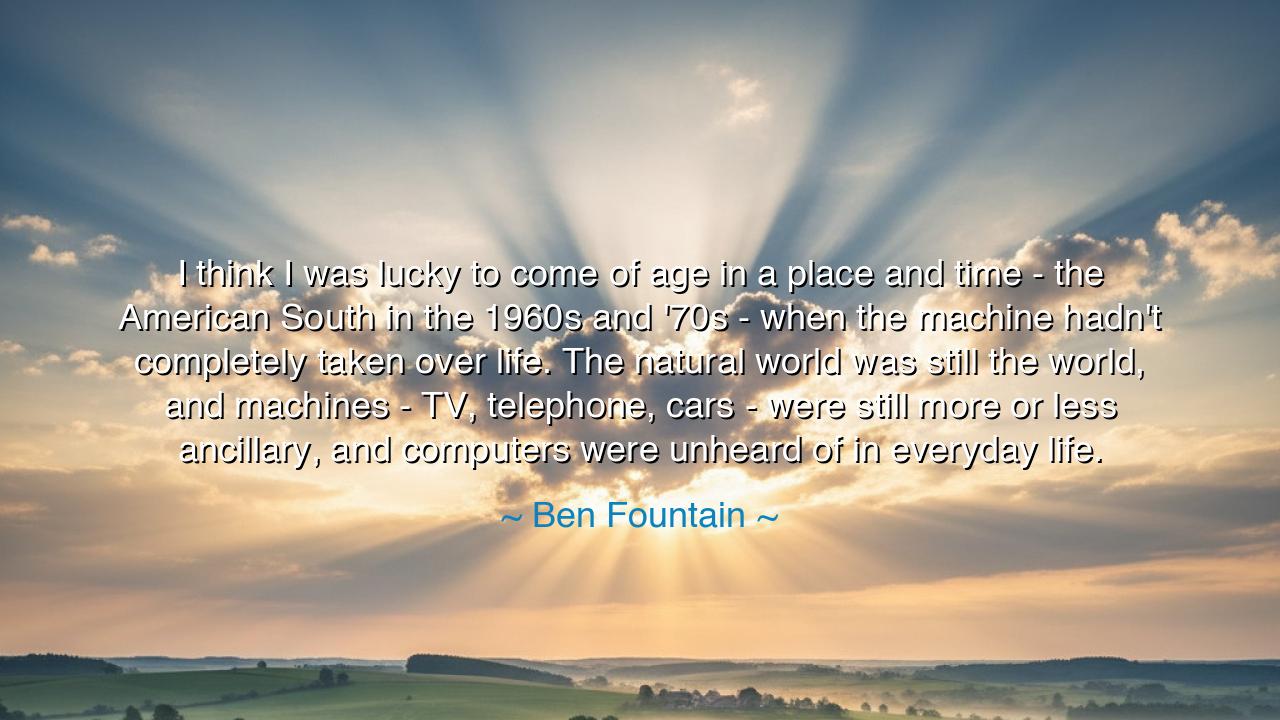
I think I was lucky to come of age in a place and time - the
I think I was lucky to come of age in a place and time - the American South in the 1960s and '70s - when the machine hadn't completely taken over life. The natural world was still the world, and machines - TV, telephone, cars - were still more or less ancillary, and computers were unheard of in everyday life.






"I think I was lucky to come of age in a place and time - the American South in the 1960s and '70s - when the machine hadn't completely taken over life. The natural world was still the world, and machines - TV, telephone, cars - were still more or less ancillary, and computers were unheard of in everyday life." – Ben Fountain
In the quiet whispers of history, there are moments when the world is in perfect harmony with itself, when the hum of nature is louder than the clatter of machinery. Ben Fountain, reflecting on his youth in the American South during the 1960s and 1970s, speaks to this rare time when technology had not yet engulfed the soul of life. The machines—the television, the telephone, the car—were still tools, not rulers, and the natural world still reigned supreme. There was a time, in the cradle of the South, when the earth’s rhythms, the song of the birds, the rustle of the leaves, and the slow-moving days, were all that guided the heart.
Consider the ancient wisdom passed down from the elders in communities, where storytelling was the soul of society. Long before the machine took its place as master, there was the connection to the land, to the seasons, and to the cycle of life that nature alone dictates. Those who lived in ancient times, particularly in agricultural societies, would have understood the rhythms of life—how the world around them moved through cycles of birth, growth, harvest, and death. The American South of Fountain's youth, in its untouched beauty, was perhaps the closest modern-day parallel to this ancient way of life, where humanity still existed in concert with the earth, not at odds with it.
In those days, the machine was not the dominating force it would become in the decades that followed. The television was a distant companion, a luxury that brought the world into the living room, but it did not yet command the minds of all who lived in the house. The telephone was something you used when needed, but it did not intrude upon every waking moment, nor did it dictate the pace of life. There was a simplicity to it all, a freedom that allowed individuals to live in the moment, to connect with one another, and to be deeply rooted in the world around them. The natural world, with its sprawling fields, dense forests, and clear skies, was still the domain of the heart and soul.
But this world, this balance between humanity and nature, began to shift in the years that followed. The computer—the very embodiment of technological revolution—emerged as an unseen force that would change the way we lived, worked, and interacted. As the machines took their hold, the pace of life quickened, and the connection to nature began to fade into the background. This transformation was not sudden, but like the slow creep of the seasons, it was inevitable. Just as Icarus flew too close to the sun and was burned by his ambition, so too did humanity become enamored by its creations, its machines, without realizing the cost to its soul.
Yet, there is wisdom in Fountain's reflection—to recognize that the simplicity of a time when the world still operated on its natural rhythms is a precious gift. In this world of constant connectivity, where computers and smartphones dictate the speed of existence, there is something deeply moving about remembering when life was slower, when people could sit and listen to the world, and when the dawn did not arrive with a beep from a phone, but with the gentle stirring of birdsong. It is a reminder that the machine, for all its benefits, can often strip away the very things that make life meaningful: connection, contemplation, and reflection.
Thus, the lesson we take from this is clear: while we must embrace the progress that technology brings, we must never lose sight of the natural world. In our rush to modernize, to connect, and to advance, we must strive to preserve the quiet, the stillness, and the rhythms of life that speak to our souls. The machines are useful—they help us move, communicate, and evolve—but they should never overpower our connection to the world, to each other, and to the simple beauty that surrounds us. As the ancients once understood, true wisdom lies in finding balance: to use the tools we have created, but to never forget the wisdom that nature teaches.
So, as we move forward into a world dominated by machines, let us remember the days when the world was still ruled by the gentle hand of nature. Let us reclaim the quiet moments of reflection, the slow walks through the fields, and the disconnected conversations that help us remain grounded in the world around us. May we live with the wisdom of both progress and simplicity, remembering that while machines can shape our future, they should never define our humanity.






AAdministratorAdministrator
Welcome, honored guests. Please leave a comment, we will respond soon